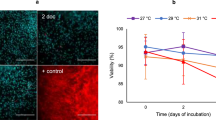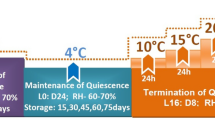Abstract
Theileria parva is responsible for East Coast fever of cattle—a disease which is usually fatal and which is characterized by an acute thermal reaction, a lymphoid hyperplasia followed by exhaustion of the lymphoid tissues and leucopenia.
This is a preview of subscription content, access via your institution
Access options
Subscribe to this journal
Receive 51 print issues and online access
$199.00 per year
only $3.90 per issue
Buy this article
- Purchase on Springer Link
- Instant access to full article PDF
Prices may be subject to local taxes which are calculated during checkout
Similar content being viewed by others
References
Hulliger, L. Wilde, J. K. H., Brown, C. G. D., and Turner, L., Nature, 203, 728 (1964).
Hulliger, L., J. Protozoology (in the press).
Stoker, M., and Macpherson, I., Virology, 14, 359 (1961).
Trager, W., Ann. Trop. Med. Parasitol., 53, 473 (1959).
Author information
Authors and Affiliations
Rights and permissions
About this article
Cite this article
HULLIGER, L., BROWN, C. & WILDE, J. Transition of Developmental Stages of Theileria parva in vitro at High Temperature. Nature 211, 328–329 (1966). https://doi.org/10.1038/211328a0
Issue Date:
DOI: https://doi.org/10.1038/211328a0
This article is cited by
-
Theileria annulata histone deacetylase 1 (TaHDAC1) initiates schizont to merozoite stage conversion
Scientific Reports (2022)
-
The effects of drugs on the formation of Theileria annulata merozoites in vitro
Parasitology Research (1988)
Comments
By submitting a comment you agree to abide by our Terms and Community Guidelines. If you find something abusive or that does not comply with our terms or guidelines please flag it as inappropriate.



